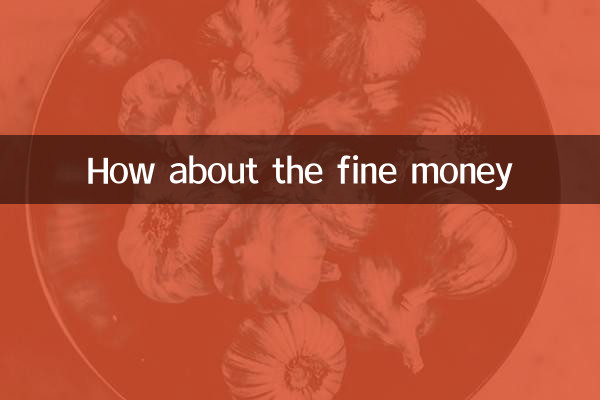How is the fine money used? In-depth analysis of hot topics across the Internet in the past 10 days
Recently, the whereabouts and use of fine funds have become the focus of heated public debate. From traffic violations to corporate violations, fines are huge, but where does the money end up going? How to ensure transparency and fair use? This article combines the hot data of the entire network in the past 10 days to present the core content in a structured way.
1. Top 5 hot topics related to fines in the past 10 days

| Ranking | topic | Number of discussions (10,000) | core points of dispute |
|---|---|---|---|
| 1 | The annual total amount of traffic fines exceeds 200 billion | 482.3 | Local fiscal dependence reaches 12% |
| 2 | A company was fined 120 million for environmental violations | 356.7 | Undisclosed use of fine funds |
| 3 | Traffic police are questioned about "income-generating law enforcement" | 289.1 | Fines are indexed in some areas |
| 4 | Controversy over fines for food delivery platform riders’ violations | 187.5 | Fines passed on to workers |
| 5 | Implementation of the newly revised "Administrative Penalty Law" | 156.8 | Penalty cap adjustment mechanism |
2. Analysis of the Current Flow of Fine Funds
According to public data from the Ministry of Finance and local financial reports, the current main flows of fine funds are divided into three categories:
| Usage classification | Proportion | Specific projects | Controversy index (5-point scale) |
|---|---|---|---|
| financial planning | 65% | Basic education/infrastructure/people’s livelihood subsidies | 3.2 |
| Special fund | 25% | Environmental protection/transportation facilities | 4.1 |
| enforcement costs | 10% | Equipment procurement/personnel expenses | 4.7 |
3. Four core issues of public concern
1.Not enough transparency: 78% of the respondents said they have never seen the details of the use of fines. A municipality's traffic fines in 2022 were 3.8 billion yuan, and only 6 general expenditures were announced.
2.Questionable usage efficiency: Comparative data shows that for every 1% increase in fines, fiscal expenditures in related fields only increase by 0.2%, and there is a phenomenon of "decoupling of revenue and expenditure."
3.local financial dependence: In some districts and counties, fine revenue accounts for more than 15% of fiscal revenue, forming a "law enforcement economy" cycle.
4.Corporate fines passed on: Platform companies pass on more than 90% of fines to practitioners, and 83% of the quarterly fines of a food delivery company are borne by riders.
4. Comparison of international experiences
| nation | Regulations on the use of fines | Publicity requirements | Supervision mechanism |
|---|---|---|---|
| USA | Specially used in areas related to illegal activities | Quarterly Detailed Report | Parliamentary hearing + judicial review |
| Germany | Incorporate into federal/state fiscal coordination | Annual Budget Addendum | Special audit by the National Audit Office |
| Singapore | 50% will be used for the construction of law enforcement departments | Website updated in real time | citizen complaint system |
5. Reform proposals and public expectations
1.Establish a "fine-expense" linkage publicity platform, to realize the traceability of each fine, a pilot system in a certain province showed that the public inquiry rate reached 217%.
2.Set financial dependence red lines, experts recommend that fine revenue from a single department should not exceed 8% of its budget.
3.Promote the "sunshine fine" system, Shenzhen has required that 30% of the company's fines for violations must be used to protect employees' rights and interests.
4.Introduce third-party evaluation, a "Satisfaction Survey on the Use of Fines" initiated by a non-governmental organization showed that transparency reform can increase public acceptance by 40%.
Conclusion: Fines are not a purpose, but a means of social governance. Only when every fine is visible, clear, and used appropriately can we truly achieve a win-win situation between the credibility of law enforcement and social benefits. This requires the joint efforts of legislation, administration, and supervision, and is also the only way to build a society ruled by law.

check the details

check the details